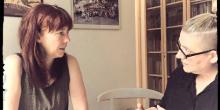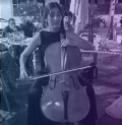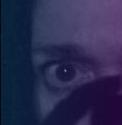Feminist and arts organisations are doing a great deal more to make the world a better place!

Our program of feminist philanthropy and our edition “They inspire and motivate us” continues with presenting you the cyber artist Helen Varley Jamieson.
Helen is a writer, performer, director and producer from New Zealand and specifically she has launched the form of cyberformance, via internet and the platform Up Stage connecting all the corners of the world, where everyone could participate in the performance in progress.
Currently Helen lives in Munich and starts Magdalena München, so you could follow the actions online, look at the programs and donate support.
We asked her some questions:
Why is it important to organize feminist festivals and gatherings?
So that we can come together as feminists in safe spaces where we can share and exchange and learn from each other, support each other and think about where we are now and why we still need feminism. I believe that we do still need it, and it’s particularly important right now as we are in a stage of transition, ideologically, in the western world. As feminists, we have the opportunity to shape that for the good of everybody. Right now in Munich I am working to develop the Magdalena Project network here, organising small events with the idea of gaining support for a festival, and it’s very interesting to navigate a different culture’s attitude towards feminist events, and to see how feminist organisations work here. In many ways it is quite well supported, but it’s also quite institutionalised, and I’m coming in as an outsider trying to establish something new, with limited language ability. But in general there is interest and support for Magdalena here.
OK. And do you think it’s important to invest money in women’s human rights, particularly in women’s art?
… I believe it’s important to invest money in everybody’s human rights. But in many human rights issues, women and children are particularly disadvantaged, for example in refugee situations, so they need to be specifically targeted and supported. Arts projects that address human rights are important for raising awareness and helping to create change, they can bring attention and thought and awareness to these issues. Women’s art that addresses women’s human rights brings female perspectives to those issues, and that is valuable and deserves to be supported.
Do you think it’s important to have local feminist foundations and do you know of some feminist foundations?
I know of this really amazing one in Belgrade that’s called the Women’s Reconstruction Foundation … (laughs) … Yes, I know many feminist organisations that are doing an incredible amount of good work in a range of ways, usually with very little money. It’s the same for arts organisations – we get very little money and we do so much with it, and we have to be much more accountable than much larger organisations. Look at the Olympics or FIFA for example, with their huge budgets and significant influence in the world – and the extent of corruption that’s now to being revealed there. In my opinion, feminist and arts organisations are doing a great deal more to make the world a better place than the likes of these commercially-oriented sports organisations. So it’s vitally important that we have, and support, local feminist and arts foundations. I’m still getting to know the various organisations here in Munich and how they relate to each other, and how they are supported.
What is a concept of solidarity for you?
Being supported, being held, keeping it together in extreme situations. I’m getting a methaphorical image of something really dense, tightly packed – like we have taken a bag and stuffed it so it’s really, really packed and full and solid and that’s my kind of image of solidarity at the moment, about being together and holding and supporting each other.
It’s about supporting work or people that you might not even have a lot in common with, but supporting it because it’s socially or politically important to you. For example, in the Magdalena context, which is theatre-based, many people think my cyberformance work (live performance on the Internet) is pretty weird but they support it because they respect that I am developing something with it. That’s one of the things that I love about Magdalena – we respect each others’ work and recognise the importance of what each other is doing. We can do that within the Magdalena network, and we can also do that between the arts and feminist organisations. For example, what you do with ACT Women – taking the message out into the streets – you have got women doing the political activism and arts working together. Making those connections and conversations and synergies mean that our energies can be more effective than when we struggle away on our own.
OK, thanks.
To see and share interviews go to http://www.rwfund.org/eng/2016
Interview: Zoe Gudović
Transcription: Ana Imširović Đorđević





